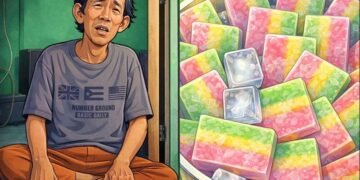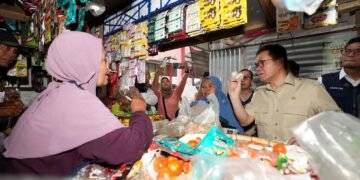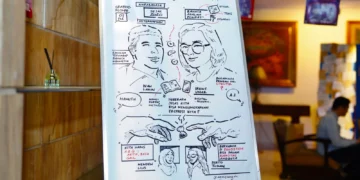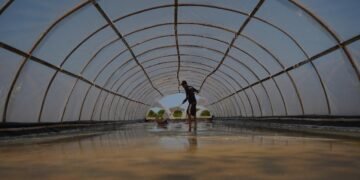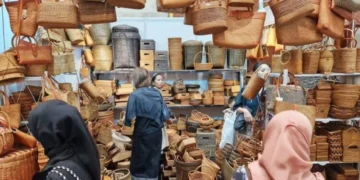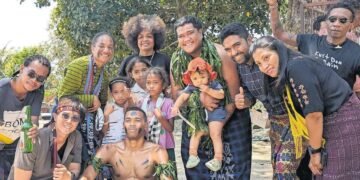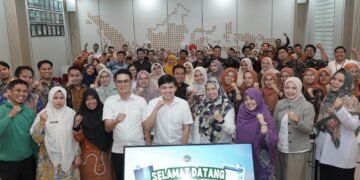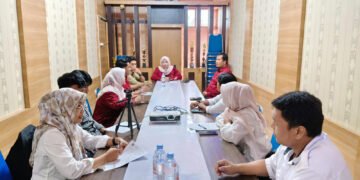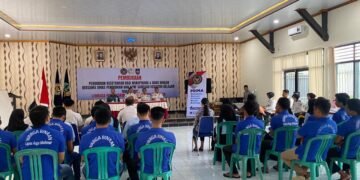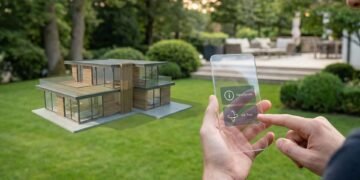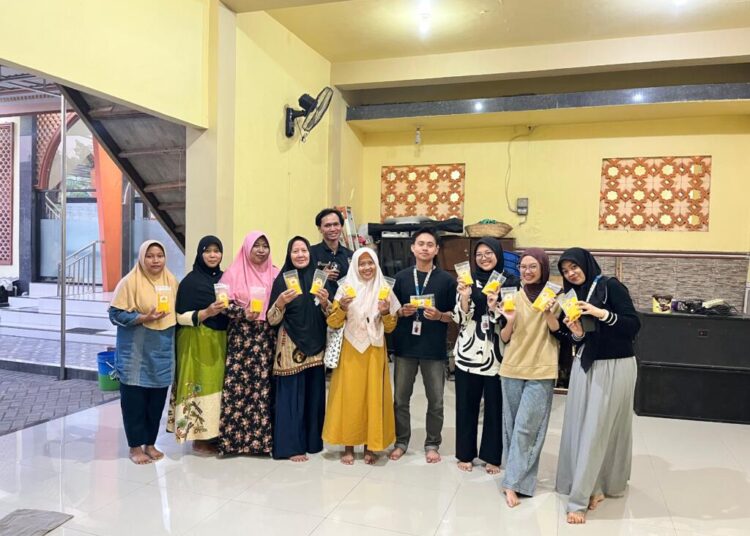Sidoarjo – Saturday, August 9, 2025, marked a historic day for the herbal medicine (Jamu) SME in Kedurus Hamlet, Kepatihan Village, Tulangan District, Sidoarjo Regency. The 2025 Community Service Program (KKN-T) of the University of Muhammadiyah Sidoarjo (Umsida) Group 03 implemented a program to upgrade local herbal medicine products, as an effort to support the sustainability of small businesses while strengthening competitiveness amidst the tight modern market.
This program emerged from discussions between the Umsida Community Service (KKN-T) team and the ‘Aisyiyah Branch Leadership (PRA) of Kedurus Hamlet, which oversees local MSMEs. The herbal medicine MSME in Kedurus has been producing herbal turmeric products, but has encountered various marketing challenges.
“Honestly, we’ve had a hard time competing with other MSMEs due to our lack of understanding of current technology. With the help of the Community Service Program students from Umsida, we’ve found it very helpful. One way we’ve done this is by upgrading our packaging to make our products more attractive and have a higher selling value,” said Mrs. Titin, treasurer of PRA and a member of the Kedurus herbal medicine MSME.
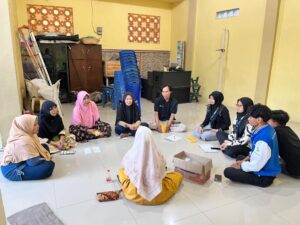
The first step taken by the Umsida Community Service Program (KKN-T) team was to hold a discussion with MSME members. The event was a lively one, involving students and MSME owners. The forum addressed various important aspects, from rudimentary financial management issues and suboptimal marketing strategies to the importance of product packaging that can compete with similar products on the market.
According to Ms. Ilil, a member of the Kedurus herbal medicine SME, financial management has not been a top priority. She said, “We haven’t really thought about profit because we share every sale equally. Sometimes we don’t even notice it; the money that should be profit is just gone, and we’ve even made a loss.” This statement illustrates that the spirit of togetherness often takes precedence over business calculations, making it difficult to measure business progress. Through student mentoring, SMEs are beginning to realize the importance of profit and loss recording as a foundation for assessing business health and developing development strategies.
In this regard, the involvement of various departments in the Umsida Community Service Program (KKN-T) team was very beneficial to the program’s success. Students from the Management Study Program helped provide guidance on more structured financial records. Students from the Communication Science Study Program explained digital promotion strategies through social media and how to create more engaging content. Meanwhile, students from the Digital Business Study Program played a key role in redesigning the packaging and improving the e-commerce account, so that Kedurus herbal medicine products could be more widely recognized in the modern market. This cross-departmental collaboration made the rebranding program more comprehensive, not only improving product appearance but also strengthening management and marketing aspects.
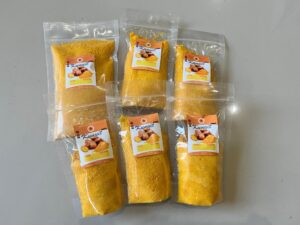
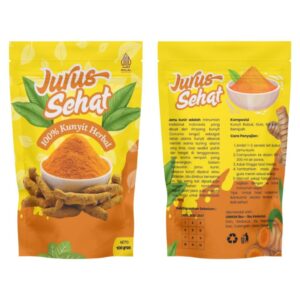
One of the most tangible results of this program is the transformation of herbal medicine packaging. Previously, herbal medicine products were simply packaged in plain plastic with a simple label, but now their appearance has drastically changed, becoming more modern, freshly colored, and in line with market trends. This visual change creates a professional impression, increasing both consumer appeal and trust, especially given the product’s superiority in using selected natural ingredients without chemical additives, making it safe for daily consumption.
The new packaging, branded “Jurus Sehat,” displays a clearer product identity, from a neat logo and a turmeric illustration that reflects a natural and healthy image, to important information such as ingredient composition, preparation method, health benefits, expiration date, and halal certification. These details not only enhance aesthetic value but also provide a sense of security to buyers that the herbal medicine is guaranteed to be of high quality and authentic. Interestingly, Kedurus herbal medicine now comes in several variants: turmeric, Javanese ginger, ginger, and galangal. Each variant has its own benefits: turmeric is known to help maintain digestive health and reduce inflammation, Javanese ginger is useful for increasing appetite and maintaining liver function, ginger helps relieve colds and warms the body, while galangal can help relieve mild aches and support the immune system. With affordable prices, all these variants are easily accepted by various consumer groups according to their needs.
This packaging change isn’t just about appearance; it’s also a smart marketing strategy. Amidst fierce competition, packaging is often the first factor consumers notice before making a purchase. With a new, more attractive and informative look, coupled with the product’s health benefits and diverse range of options, Kedurus herbal medicine now has a greater chance of attracting attention, both in traditional markets, modern stores, and online platforms.
In this upgrading process, Umsida KKN-T students from the Digital Business Study Program played a key role in redesigning the packaging, from color selection and typography to information layout to make it more communicative. Meanwhile, students from other departments supported through digital marketing strategies, such as creating an online store account on Shopee and utilizing social media platforms like Instagram and TikTok. Thus, Kedurus herbal medicine, which now appears more professional and comes in various healthy variants, is not only marketed within the village but also has the opportunity to reach a wider consumer base.
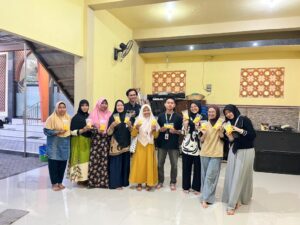
As a symbol of success, the activity concluded with a group photo of the Umsida Community Service Program (KKN-T) team and the women members of the MSMEs. In the photo, they posed cheerfully while holding herbal medicine products in their old packaging. Nevertheless, this moment held significant meaning as it represented the journey of change from simple packaging to a new, more modern design. The photo served as a reminder that every small step is part of the process towards progress.
On that occasion, Mrs. Titin, one of the MSME representatives, expressed her gratitude. “With this rebranding, we have more confidence in marketing Kedurus herbal medicine. We hope this product will not only be in demand in the surrounding village but will also penetrate a wider market,” she said hopefully. This statement reflects the MSME owners’ renewed confidence that the collaboration with students not only provides knowledge but also fosters optimism for the future of their businesses.
Impact and Future Hopes
This upgrading program is not just about changing the packaging, but also marks the first step in transforming the herbal medicine MSME in Kedurus Hamlet into a more professional business. With a new, more modern, informative, and trend-aligned look, Kedurus herbal medicine products now have a greater opportunity to attract consumers, both in traditional markets and modern stores, and even on digital platforms. This change also serves as a long-term strategy to ensure herbal medicine products can compete with similar brands outside the village. One of the future marketing plans is to consign products to minimarkets located in the Muhammadiyah boarding school area, utilize the network of Muhammadiyah-affiliated figures to expand reach, and distribute products to other herbal medicine kiosks for wider distribution. With this strategy, it is hoped that Kedurus herbal medicine will not only be known locally but also gain more stable and sustainable market access.
Beyond the visual changes, another tangible impact is the increased capacity of MSMEs. The knowledge provided by Umsida Community Service Program students, ranging from more organized financial record-keeping and inventory management to digital marketing strategies, provides a crucial foundation for sustainable growth for these MSMEs. With these skills, these entrepreneurs no longer rely solely on local sales but also venture into online markets and expand their customer base.
For the Kedurus community, this activity demonstrates that the presence of KKN-T students goes beyond simply living in the village and truly brings positive impacts. The spirit of mutual cooperation is evident throughout the process, as students and residents work together, share knowledge, and support one another. This cross-generational collaboration demonstrates that the knowledge students bring can combine with the local wisdom of the community to create real change.
Looking ahead, the hope is that Kedurus herbal medicine, with its new look, can become an iconic local village product, known not only in Sidoarjo but also reaching a wider market. With stronger branding, consistent digital promotion, and a targeted distribution strategy through a network of minimarkets and Muhammadiyah partner stores, as well as herbal medicine kiosks in Sidoarjo and the surrounding area, this MSME has the potential to become a successful example of how villages can develop traditional products into more valuable and highly competitive products.
Syarat dan Ketentuan Penulisan di Siaran-Berita.com :
Setiap penulis setuju untuk bertanggung jawab atas berita, artikel, opini atau tulisan apa pun yang mereka publikasikan di siaran-berita.com dan klaim apa pun yang timbul dari publikasi tersebut, termasuk, namun tidak terbatas pada, klaim pencemaran nama baik, pelanggaran privasi, pelanggaran hak cipta, merek dagang, nama dagang atau pelanggaran paten, berita palsu, atau klaim lain apa pun yang didasarkan pada perbuatan melawan hukum atau kontrak, atau berdasarkan undang-undang negara Republik Indonesia
Selain itu, setiap penulis setuju, untuk membebaskan siaran-berita.com dari semua klaim (baik yang sah maupun tidak sah), tuntutan hukum, putusan, kewajiban, ganti rugi, kerugian, biaya, dan pengeluaran apa pun (termasuk penilaian biaya pengacara yang wajar) yang timbul dari atau disebabkan oleh publikasi berita apa pun yang dipublikasikan oleh penulis.”




